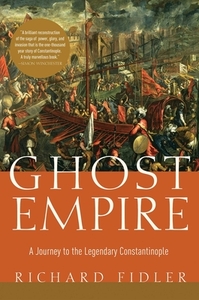Take a photo of a barcode or cover
Fidler has tackled a story nearly 1500 years long, and actually made it interesting. Don’t get me wrong - there were times it felt a bit repetitive, but he interspersed lovely vignettes of his time in Istanbul with his son which somehow gave life to the city and complemented the history beautifully. In someone else’s hands, this book probably wouldn’t have grabbed my attention, but I really enjoy Fidler’s writing, so it’s a 4 star book for me.
adventurous
informative
inspiring
reflective
tense
slow-paced
Read in preparation for my trip to Turkey and I'm now crazy excited to search for shadows of Byzantium in the streets of Istanbul.
Highly recommend this one as an interesting and frequently bloody primer on the history of the eastern roman empire and the epic 1453 siege of Constantinople (seriously, how has this not been made into a movie yet?) that brought about its end.
The travelogue-style sections of the book were short and enjoyable enough and left me thinking a little more philosophically about history and our place in it.
Highly recommend this one as an interesting and frequently bloody primer on the history of the eastern roman empire and the epic 1453 siege of Constantinople (seriously, how has this not been made into a movie yet?) that brought about its end.
The travelogue-style sections of the book were short and enjoyable enough and left me thinking a little more philosophically about history and our place in it.
Enjoyed this overview of the history of one of my favorite cities, and if he covered this span of history which as much depth as I would have enjoyed the book would have been at least three times longer.
4.5
I really liked Ghost Empire by [a:Richard Fidler|1907802|Richard Fidler|https://s.gr-assets.com/assets/nophoto/user/m_50x66-82093808bca726cb3249a493fbd3bd0f.png]
As Richard Fidler and his son Joe make a journey to Istanbul, it inspires their passion for the rich history of the dazzling Byzantine Empire - centred around the legendary Constantinople. In that we get these amazing historical stories. Its a story of clash of civilisations, the fall of empires, the rise of Christianity, revenge, lust, murder.
I love that the historical stories are told side by side with modern Istanbul as Father and Son travel. I particularly love the bond between Richard and his son Joe; their love for history.
Truly beautiful and would definitely recommend it!
I really liked Ghost Empire by [a:Richard Fidler|1907802|Richard Fidler|https://s.gr-assets.com/assets/nophoto/user/m_50x66-82093808bca726cb3249a493fbd3bd0f.png]
As Richard Fidler and his son Joe make a journey to Istanbul, it inspires their passion for the rich history of the dazzling Byzantine Empire - centred around the legendary Constantinople. In that we get these amazing historical stories. Its a story of clash of civilisations, the fall of empires, the rise of Christianity, revenge, lust, murder.
I love that the historical stories are told side by side with modern Istanbul as Father and Son travel. I particularly love the bond between Richard and his son Joe; their love for history.
Truly beautiful and would definitely recommend it!
4.5 stars. I visited Istanbul in 2018 and remember vividly the first time I stepped into the Hagia Sophia. It's a remarkable building (that took a mere 5 years to build in 532AD!) - you can imagine what an impression such a massive, otherworldy space would have on people nearly 1500 years ago, let alone today. It's one of the main (intact) relics of the Romans still standing in the city.
But the rest of beautiful Istanbul is cluttered with crumbling ruins of its past, like the remains of the lonely Theodosian Walls. I was left wondering...what happened to this Byzantine lot then? What went wrong?
Ghost Empire by Richard Fielder provides an excellent answer, a compelling account of the rise and fall of Constantinople, the last great city of the Romans and easily one of the best history books I've read.
So many different interesting stories are weaved into a 1000+ year narrative that alternates between a trip in the present day with the author and his son, drawing human connections across time between the intrigues of the various back-stabbing, scandalous plotting emperors and the present day. One of my main takeaways is that those emperors seriously loved gouging out the eyes of their *insert family relation*. A good thing some traditions didn't last...
Though ultimately the story of Constantinople is one of gradual decline, they still hung on for over 1000 years and continue to have an influence on the world to this day. You couldn't ask for a more fascinating and accessible account. Read this book!
But the rest of beautiful Istanbul is cluttered with crumbling ruins of its past, like the remains of the lonely Theodosian Walls. I was left wondering...what happened to this Byzantine lot then? What went wrong?
Ghost Empire by Richard Fielder provides an excellent answer, a compelling account of the rise and fall of Constantinople, the last great city of the Romans and easily one of the best history books I've read.
So many different interesting stories are weaved into a 1000+ year narrative that alternates between a trip in the present day with the author and his son, drawing human connections across time between the intrigues of the various back-stabbing, scandalous plotting emperors and the present day. One of my main takeaways is that those emperors seriously loved gouging out the eyes of their *insert family relation*. A good thing some traditions didn't last...
Though ultimately the story of Constantinople is one of gradual decline, they still hung on for over 1000 years and continue to have an influence on the world to this day. You couldn't ask for a more fascinating and accessible account. Read this book!
over 1000 years are covered in 400 pages! a great starting point for more study. and to think the Ottoman have only been in Istanbul for 600 years. My first choice for further study will be the General Basileus.
Histories are very rarely my thing. This was a book club pick that I delayed starting but was pretty surprised by. The author uses a personal story as a framing for recounting an overarching history of the Byzantine/Eastern Roman Empire, especially focused around the city of Constantinople. The framing story ties together the accounting of history along with a number of interesting stories and digressions that made for an interesting read. I found it both interesting and engaging and really appreciated that the author clearly delineated when a story was mostly lore or accounts of an event were few or questionable but still telling the tales to create interesting through lines.
While I could have done without some of the personal anecdotes, I feet that the format allowed the author to show some of the correlations and contrasts to modern day society. Would recommend.
The audiobook is narrated by the author and I think his authentic enthusiasm for the topic enhances the reading.
While I could have done without some of the personal anecdotes, I feet that the format allowed the author to show some of the correlations and contrasts to modern day society. Would recommend.
The audiobook is narrated by the author and I think his authentic enthusiasm for the topic enhances the reading.
Such an enjoyable read! Richard has a way with words (which wouldn't surprise people who are familiar with Richard's Conversations!)
I loved the interweaving of the story of Constantinople with anecdotes of Richard and Joe's visit. I wish I could've been there to tag along with them.
I loved the interweaving of the story of Constantinople with anecdotes of Richard and Joe's visit. I wish I could've been there to tag along with them.
informative
reflective
sad
medium-paced
it's KYIV, not Kiev


